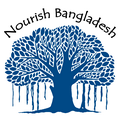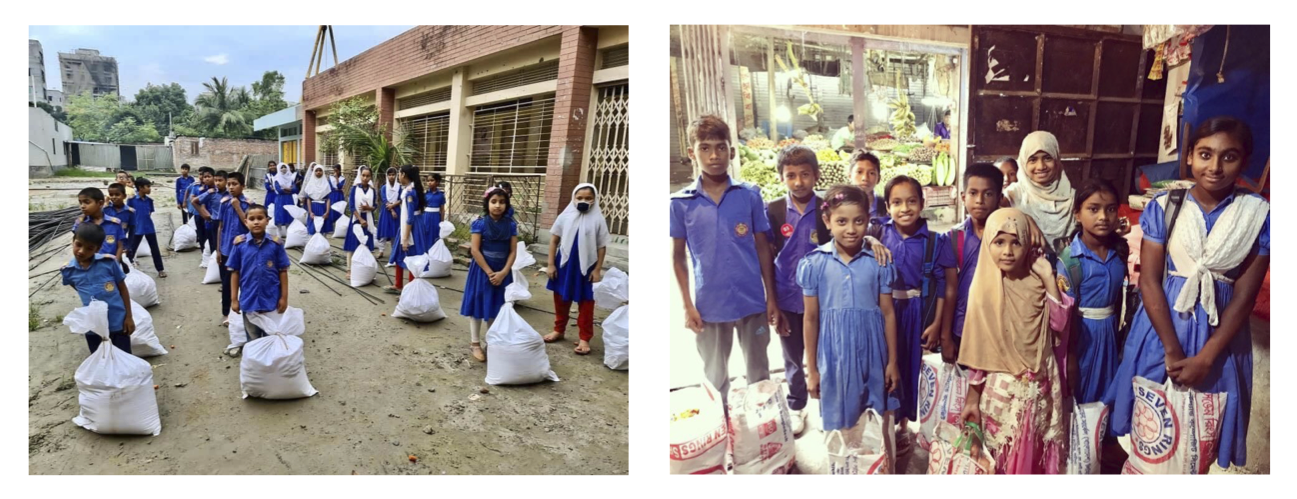Volunteer Group Led By Azdani N. Bari
All donations made to Nourish Bangladesh by US residents are tax deductible since Nourish Bangladesh is an IRS approved 501(c)(3) organization.
Who is Azdani N. Bari?
Highlights
Donations made to Azdani N. Bari from Nourish Bangladesh will reach needy families with young children identified through her local community network. Azdani's volunteer group will continue to work with underprivileged students of Gawair Nobin Government Primary School in Dhaka, as well as other school children in the area. With our initial funding, these children and their families will be provided with one month's worth of food. Azdani plans her relief pakages carefully, with particular attention to the needs of children such as nutrious food to help them grow and flourish.
Responses to Vetting Questions
These are the responses we were provided by Azdani who will be leading the volunteer group, with regard to their general activities and their plans for using the funds donated through our fundraising campaign. We researched and asked the same set of standard questions to the other volunteer groups we vetted as well.
Question: Does your volunteer group have a name? If so, what is it?
Response: Currently we do not. Our last project was named "Making the Eid Better."
Question: What is the size of your group? Can you tell us a bit about the organization or structure of your group (e.g. one organizer, three field workers, one treasurer, etc.)?
Response: The total size of my group is thirteen people. I am the organizer, coordinator, and fundraiser. I work with five volunteers for packaging, three volunteers for distribution, and four volunteers of the underprivileged government primary school including the school committee member, head teacher, and teachers who also help with distribution. My friends and acquaintances sometimes help out as well.
Question: With our donation, what do you expect the geographical spread of the relief recipient to be (e.g. Dhaka city, rural Mymensingh, etc.)?
Response: The outskirts of Dhaka (Gawair).
Question: With our donation, which groups will be helped (e.g. LGBTQ community, Transgender community, street children, Garo indigenous population, sex workers, gypsy community)?
Response: Low income household with children (sometimes street children).
Question: What is your motivation to start or get involved in this volunteering work? Is your group's approach religiously neutral in term of the people you help and the volunteers you employ?
Response: My motivation has been my passion to work for children as they are the most innocent human beings on Earth. Children can be happy if their families are happy, so their families should be taken into account. It started when I saw many schools in Dhaka city have children dropping out of school because they need to work to support their families. These children do not receive enough food and can not exercise their rights to education, rest, and play. With more funds, OI hope to extend the food aid project further. This project has health benefits for the children and their families because they are provided with nutritional food. We have a religiously neutral approach in terms of the people we help.
Question: Can you give us a price breakdown of how much money is spent towards food relief (e.g. with 1000 taka we offer lentils, rice, onions, and potato for a family of 4 for two weeks) or how much cash is handed to each household (e.g. 1800 taka for each adult in a household)?
Response: We offer roughly 1 month of food for 2000 taka (approx. 23.5 USD). Of the 2000 taka, only 50 taka is used for paying the volunteers (35 taka) and packaging (15 taka). The remaining 1950 taka is used to buy 15 kg rice, 2 kg lentils, 5 kg potatoes, 2 kg chickpeas, 1 kg salt, and 1 liter oil.
Question: We prefer our donations be used for cash transfers or food relief. Nonetheless, what type of other services, if any, other than food relief or cash transfer will be provided with our donations?
Response: We are currently providing only food relief.
Question: Can you ensure our donation money is spent only on food relief or cash transfer? If not, can you provide a list of services our fund will be used for?
Response: Yes.
Question: Are you able to customize your food relief or cash transfer efforts based on what we want the donation to be used for?
Response: Yes, I can customize the donations according to your preference as long as the food is nutrituous. Azdani is hesitant about offering cash relief because of potential misuse of the money.
Question: Do you have any mechanism to ensure transparency of exactly where our money is going?
Response: I am happy to share grocery receipts and testimonies from the beneficiaries. I can also offer you name, phone numbers, and addresses of the students who receive the relief.
Question: Can you give us an estimate of what percentage of our donation is used up in overhead cost i.e. if we donate 1000 USD, what fraction of that will go directly to the poor?
Response: For every 1000 USD $ donation, around 42 families with 5 members on an average will receive hunger relief, and eight volunteers will be paid 17.20 USD in total. This means 98% goes to the beneficiaries for food relief directly, and the eight volunteers from poor families themselves will receive 2% of the total donation. Local shopkeepers who sell the groceries will benefit from our funds as well, and they typically belong to lower income groups.
Question: Can you give us a very brief history of your relevant past efforts that makes you uniquely suited to carry out relief efforts in the face of Covid-19?
Response: I have volunteered and initiated the project called “Making The Eid Better” for the last three years. Although Eid is one of the main festivals in Bangladesh, the marginalized group of people cannot celebrate Eid properly because they hardly have basic food and necessities. My project idea was that the underprivileged families could be supported with necessary food aid all throughout the month of Ramadan and not just singularly for the few days of Eid festival. This year due to COVID-19, I helped underprivileged students of Gawair Nobin Government Primary School whose parents’ livelihoods have completely halted from the lockdown. On April 23, 2020, 105 poor families were given basic food items such as 15 kg rice, 2 kg lentils, 5 kg potatoes, 2 kg chickpeas, 1 kg salt, and 1 L oil. On May 5, 60 families received groceries, and 40 more families were reached on May 19. On May 23, 75 families received food aid. As of now, 350 families with five members on average (1750 individuals) have been reached.
Question: Do you have any mechanism in place to ensure that you are aware of which households are getting help from the government, so as to avoid overlapping coverage with government efforts?
Response: Yes. We follow the local news and newspapers and select areas we feel are outside the jurisdiction of Dhaka City corporation. Afterwards, 5 volunteers go for random surveys in households, from children, from teachers in underprivileged government primary school in the area. All these ensures us and give us a good idea about no overlapping coverage with government efforts.
Question: If you get sick or are unable to continue leading/volunteering in the group, how will your campaign continue?
Response: My friend will take over the group.
Question: Are you currently working with any NGOs (funded or contracted)? If so, who are they and briefly describe the nature of these funds/contracts.
Response: I am not currently working with any NGOs regarding my personal project of "Making The Eid Better." Usually this project has been funded by me and my personal contacts so far for the last 3 years.
Updated: 06/24/2020







